Search Results for: the wall
Genre: Drama/Crime
Premise: An Australian heroin-addict prisoner escapes to Mumbai to disappear, before cozying up with the local mob to make ends meet, and falling in love with a fellow criminal.
About: Shantaram is widely considered to be one of the top 10 books that have not been adapted into a movie or a TV show. After 20 years, all that TV streaming money finally resulted in an adaptation (starring Charlie Hunman, release date TBD). But I recently learned that Eric Roth did a feature screenplay adaptation of the book. Once I found that out, I had to read it!
Writer: Eric Roth (based on the novel by Gregory David Roberts)
Details: 146 pages

Eric Roth is one of the top 10 writers on my Best Screenwriters in the World list. So you know I had to check this out. I read the book years ago. I’ve heard of numerous attempts to make it into a movie since. They just couldn’t make it happen. Let’s see what Roth did with it.
Lin is an Australian heroin addict who robbed and stole to feed his drug habit. This gets him sent to prison. But you can’t keep Lin locked up for long. He orchestrates an escape, heads to the nearest airport, and gets as far away from Australia as possible. Which is how he ends up in Mumbai.
Once in Mumbai, he meets a tour-guide named Prabaker, who may be the most persistent tour guide in the city. Lin asks him only for a hotel recommendation, but Prabaker will not go away. He wants to show Lin the entire city. So he begins driving Lin around, which allows Lin to meet some of the locals.
One of these locals is the mysterious Klara, who Lin is immediately smitten with. Maybe because she’s a criminal like him. Lin also finds himself staying in a local slum, and when he administers a band-aid to someone with a scraped knee, word spreads quickly that the slum has a new doctor. So Lin is a doctor now.
Lin’s ultimate plan is to make it to Germany. But when his passport and all his possessions are stolen, he realizes he is now stuck here, possibly for a very long time. While he fights his way through his love story and navigates the tricky criminal underworld of Mumbai, Lin realizes that he kind of loves this city, and may want to stay for good.
Everybody who reads Shantaram loves it.
Which is why they’ve been trying to adapt it.
But Hollywood has a blindspot whereby they think anything can be adapted. And the reality is that movies work best under a certain type of structure. If your book or video game or Twitter rant doesn’t fit into that structure, it’s not going to work.
Love in the Time of Cholera. A mega-success in the publishing world. But they forced a movie out of that sucker and did anybody see it? No. Because some books just aren’t meant to become movies.
This is one of them.
Shantaram is about a dude who moves to Mumbai and experiences both the good and the bad of the city. But there’s no freaking goal. There’s no ticking time bomb. This is, essentially, travel porn. Really good travel porn.
The level of specificity here is second to none. And that **is** something audiences want to see when they go to the theater. They want to be taken to a place they’ve never been before. You can’t forget that that was one of the original appeals of film. Before we could fly from Los Angeles to Paris in 9 hours, the only way you saw another country was through magazine pictures and movies!
Which is what’s so cool about Shantaram. Cause you don’t just get taken to Mumbai. You get taken to the spots of Mumbai only the locals know about. There’s a moment in the script where they’re walking past all these men who are standing against a wall. Prubaker explains to Lin that these men have all sinned and, therefore, they’ve agreed to stand for the rest of their lives to make up for it. They even have special pole devices to keep them upright when they fall asleep.
That’s highly specific travelogue stuff there that you’re not going to find in any other screenplay.
But, again, there wasn’t enough of a narrative. Book narratives can be powered by questions: “What’s going to happen here?” And “What’s going to happen there?” Open-loop questions are enough to keep people invested. But movies need goals. And they need those goals to have stakes.
Which is why, of course, this was never made into a film, and is instead being made into a show. Books and TV are similar in that they can be built around questions such as, “Will this man and woman get together?” “Will our protagonist slip back into his drug habit?” “Will the local mob boss force our protagonist to commit a crime for him at some point?” “Will our protagonist get in touch with his daughter again?”
Those are all dramatically compelling questions. But notice that they don’t PROPEL THE STORY FORWARD. Jurassic World Dominion was not the best movie but it did have a narrative with strong immediate goals (find and save the daughter, stop the locusts from destroying the food supply) that forced the characters to be active and aggressive.
This is probably why they gave the Shantaram assignment to Roth. He’s one of the few writers who can work with slow narratives. He just did so with Dune. Forrest Gump has an elongated narrative as well.
Mostly he uses the stellar character lineup Gregory David Roberts came up with to distract us from the overall lack of plot momentum.
And Roth has an endless supply of screenwriting knowledge to help him navigate the book’s handicaps. For example, there was a chapter in the book where Lin and Prabaker witness a car crash in Mumbai. And, all of a sudden, pedestrians swarm the car, pulling the driver-at-fault out, and start beating him to death.
Roth includes that scene in the script, but he smartly places Lin and Prabaker in the car that gets in the wreck. That makes the wreck more personal, as well as more dangerous. Cause now, they’re in danger of being beaten themselves. That’s a great screenwriting tip. Always try to bring your characters closest to the action. You don’t want something cool to happen far away from your protagonist. You want them to be involved.
Probably the best example of why you pay 1.5 million dollars to have Eric Roth adapt your book is the way he handles his main character’s backstory. When Lin is in Prubaker’s village, he wakes up after a long night’s sleep and finds a little Indian girl sitting next to him with a tea set.
The girl starts talking to him in a language he can’t understand and it becomes clear she’s talking about herself. So when she stops, Lin takes it upon himself to tell her his story as well. Of course, she can’t understand him either. But it becomes a very clever way for Lin to explain a ton of backstory about himself, all in a way that feels honest. I don’t think I’ve ever seen exposition done quite this way before. And I consider it genius.

Roth also recognized that he had a goldmine in Prabaker. As I’ve told you before, if you want to write great dialogue, you need to look for DIALOGUE-FRIENDLY characters. You don’t get good dialogue out of introverted folks who carefully choose their words. Prabaker is like a coked-up Mumbai version of Yoda.
“Very few foreigners know how to speak this language, Marathi. There is only one other tourist I tried to teach to it. But he was hit by a bus who didn’t want him crossing the street when he was not looking.”
He was a single-handed lightning bolt on every page. You wanted to read whatever Prabaker said next. Which is when you know you’ve got a winning dialogue character (and a winning character in general).
Roth is such a good writer that he makes this script work. But only for what it is. Which is a distilled down version of the novel. This book was never going to work as a movie. But it was fun to read such a great writer’s attempt at it. I’m guessing it was the best draft of everyone they hired to try. Which I understand was a lot of writers.
Screenplay Link: Shantaram
[ ] What the hell did I just read?
[ ] wasn’t for me
[x] worth the read
[ ] impressive
[ ] genius
What I learned: A structure that they might have been able to use here is that Lin doesn’t want to stay in Mumbai. But when his fake passport is stolen, he’s stuck here. So that gives him his goal. He’s got to save up enough money to buy a new fake passport and a plane ticket to his final destination (we’re told he ultimately wants to end up in Germany). That gives him anywhere from 2-4 weeks here in Mumbai, which is plenty of time to experience all the city’s craziness and keep a tight enough timeline that the story contains momentum. You would then put him at the airport at the end with a choice. He’s kind of fallen in love with this city. But he has bigger goals in Germany. Does he stay or does he go? I think that’s a better structure than what we have here, which is too loosey-goosey.
Sideways meets A Christmas Carol in Alexander Payne’s latest project.
Genre: Drama
Premise: A professor at a prestigious all-boys academy in 1970 is stuck babysitting the one “holdover” over Christmas break, a student whose parents have ditched him for the holiday.
About: This is the big re-teaming (it’s Re-teaming Week here at Scriptshadow!) of Alexander Payne and Paul Giamatti (Sideways). The writer, David Hemingson, has been writing on TV shows since the 90s! This is a major departure for him and a huge new direction for his career. The Holdovers is filming in New England as we speak.
Writer: David Hemingson
Details: 117 pages
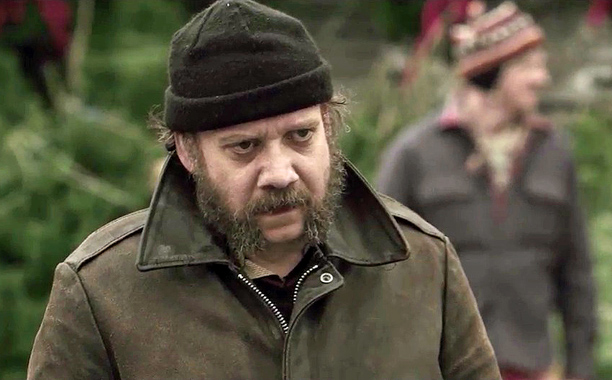
It’s crazy how dramatically one bad movie can damage a filmmaker. Even if that filmmaker has had decades of success. Payne, a darling in the indie world and a two-time Oscar winner, hasn’t made a movie in five years. All because his last film, Downsizing, was too weird and lacked a compelling plot.
But alas, we should not be punishing those who take creative risks. We should be rewarding them! In theory, at least. Let’s be honest. We’re all supportive of taking risks unless those risks turn out to suck hay bails.
50-something professor, Paul Hunham, described as “a heap of rumpled corduroy” is the most hated professor at Deerfield Academy (circa 1970). Paul is the only professor unafraid of the school’s prestigious alumni, as he proves by flunking a senator’s son, which prevents that student from being able to go to Princeton.
Because Paul is such a Scrooge, he doesn’t have any friends. Therefore, when winter break comes around, Paul has nowhere to go, and is assigned to take care of the “holdovers,” those kids who couldn’t go back to their families over Christmas for various reasons.
At the top of this reject list is 15 year-old Angus Tully, whose presence as a holdover is the direct result of his mom getting re-married to some loser who would rather go on a honeymoon than be around his new step-son. And hence the chip-on-his-shoulder Angus must stick around at a dead campus with nothing to do. A kid’s worst nightmare.
To make matters worse, all the other holdovers leave. That means it’s ONLY Paul and Angus left. And neither of them want to be anywhere near each other. They endure this for a while, having meals and studying under a series of angry glares. But they ultimately get invited to a Christmas party by a fellow female teacher, Miss Crane, who Paul has a crush on, and things pick up a bit. This begins an unexpected friendship between Paul and Angus, even if it is one explored primarily under duress.
The Holdovers feels like it’s made for a targeted audience. By that I mean, people who have gone to school at one of these all-boys academies. It’s very specific in that way, which made it hard to relate to.
And, unfortunately, I think the script made some questionable creative choices that prevented it from being better. For one, the dynamic between Paul and Angus wasn’t charged enough. Angus kind of doesn’t like Paul. Paul kind of doesn’t like Angus.
I don’t like “KIND OF” conflict. I like “ACTUAL” conflict.
There was another kid named Jenesen who was a total brat. Just a bad dude. He felt like a much bigger adversary for Paul. Those two would’ve gone at each other relentlessly and, therefore, made for a better script, in my opinion.
Speaking of, the original setup, which had five kids on holdover, sounded much more promising. Now you’ve got Dead Poet’s Society meets The Breakfast Club. A coming-of-age film with a group of kids getting in trouble. That’s a winning formula that has delivered time and time again.
The mismatched duo is also a winning formula. But only when the two opposing characters have clear conflict with one another. And like I said, these two only have “kind of” conflict with each other.
Taking this one step further, one of the big themes of the script is entitlement. These are all rich kids who have been handed everything in life. So keeping them here at this rich kid’s school doesn’t really test that. What would’ve been better is if they had to leave the school for some reason (it was temporarily shut down over the break) and stay in town, in a world that’s completely foreign to what they’re used to.
But again, we didn’t even have a group of kids. We decided to go with one kid.
I know it’s stupid to write reviews whose main focus is, “This is what I would’ve done!” But I bring it up to remind screenwriters that you always have choices in your story. And you should be asking yourself, “Is this the most dramatically interesting choice? Is there a different route that’s potentially more entertaining?”
We get major tunnel vision as screenwriters. We get so stuck on that original idea we wanted to write that we don’t see there’s a much better version of it right around the corner. This especially happens if you’re drawing on your own life experiences. You’re likely to lock in on exactly what happened to you and write that story only. Which is myopic. You have to be more dynamic as an artist.
I brought this up a couple of years ago with the movie “The Big Sick.” Now to be clear, The Big Sick was a great movie. I don’t think it’s bad by any means. But if you’re looking at the script objectively, they missed a much more dramatically interesting opportunity.
That film was about how Emily goes into a coma and Kumail has to deal with her parents during the experience. But Kumail had next-to-zero conflict with her parents. So that storyline wasn’t very compelling. Meanwhile, Kumail’s parents did not want him marrying a white woman under any circumstances. They wanted him marrying a Pakistani. Therefore, the better person to put in the coma would’ve been Kumail. That way, you would’ve put the characters who had the most conflict with each other – Emily and Kumail’s parents – around each other the whole time.
Of course, that wasn’t what happened to real-life Kumail and real-life Emily, and therefore it would’ve been difficult for them to imagine that version of the story. But the point is, you shouldn’t lock yourself into a particular storyline without considering if there’s a better dramatic option.
With all that being said, The Holdovers does come together in one of those warm Christmas-y ways where you feel good cause everyone takes down their walls and connects with one another. I can imagine watching this on Christmas Eve and feeling that good “everything’s right in the world at least for this moment” feeling that other good Christmas films like It’s A Wonderful Life give you. It’s just a hard script to wrap your head around because it keeps changing into different movies as it goes on and by the time you figure out what the actual movie is, you’re thinking, “Why didn’t we just start with this?”
[ ] What the hell did I just read?
[ ] wasn’t for me
[x] worth the read
[ ] impressive
[ ] genius
What I learned: I know some of you are terrified of character descriptions. I was once terrified of them as well. So here’s a tip. Don’t write clever character descriptions unless you’re good at them. And if you do, don’t overcomplicate them. Clever character descriptions from writers who aren’t naturally good at them are too long and come off as try-hard. Here’s an example of what I mean: “TREY, 31, has a dollar to his name but makes up for it with a million dollar smile.” What is this other than, “Look at me?” It emphasizes clever over information. If you’re going to be clever with a description, do it AS SIMPLY AS POSSIBLE. That’s why Paul’s description is so good. “A heap of rumpled corduroy.” Five words and we get it. The simpler you keep the clever description, the more likely you are to pull it off.
What I learned 2: If you want to attach Paul Giammati to your project, write a Christmas movie. This is his third Christmas movie (All is Bright and Fred Claus are the other two). He obviously likes the holiday.
Finally! The Bee Keeper script is here!
Genre: Action-Thriller
Premise: When his elderly neighbor is duped out of her entire life savings by online scammers and subsequently commits suicide, a bee keeper goes on a rampage to take the scammers down.
About: Yeah baby! Bzzzbzzzbzzzz! We’ve got a spec script that sold for over a million bucks. We’ve got Jason Statham playing the lead. David Ayer just signed on to direct the film two weeks ago. This is the kind of script writers who want to make a big splash in the business should be writing. Tyler Marceca just made a million dollars for a fun action thriller, Stay Frosty. Shay Hatten blasted onto the screenwriting A-List when he wrote a fun action thriller in Ballerina. This is a very lucrative genre for a screenwriter. And if you want to study someone who does it best, read Kurt Wimmer’s scripts. They’re some of the easiest funnest specs you’ll ever read.
Writer: Kurt Wimmer
Details: 106 pages
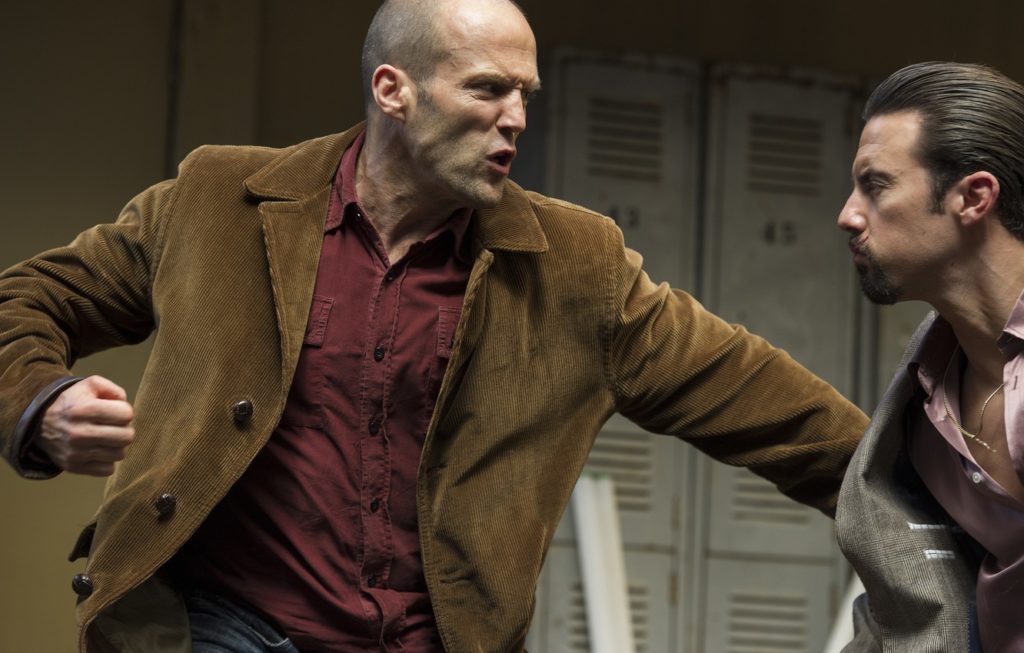
I’ve been really excited for this one.
Not only is it written by one of the most successful spec screenwriters of all time, Kurt Wimmer. It’s such a weird subject matter that my curiosity meter is off the charts. An action thriller…. About a bee keeper? Tell me more, please!
An old woman in rural Tennessee named Eloise is on her computer when she gets one of those spam warnings that most people ignore (“Your computer is infected. Call this number to fix it.”). Unfortunately, in an attempt to fix her computer, she calls the number. Within 5 minutes, her entire life savings has been stolen. That night, Eloise commits suicide.
The next day both her FBI agent daughter, Verona, and her reclusive bee keeper neighbor, Adam Clay, who she was friendly with, show up. After they both learn the truth, that a company located in Memphis called “Data Group” did this, Adam shows up at Data Group’s building the next day and burns it down.
Data Group, as it turns out, is a branch of a much larger corporation called Evermore Enterprises, run by the former director of the CIA, Westwyld. And when they find out some dude just burned down their building, they send four heavies to take him out. Except they do not “take him out.” They get taken out in some of the best action-fight writing I’ve seen in years.
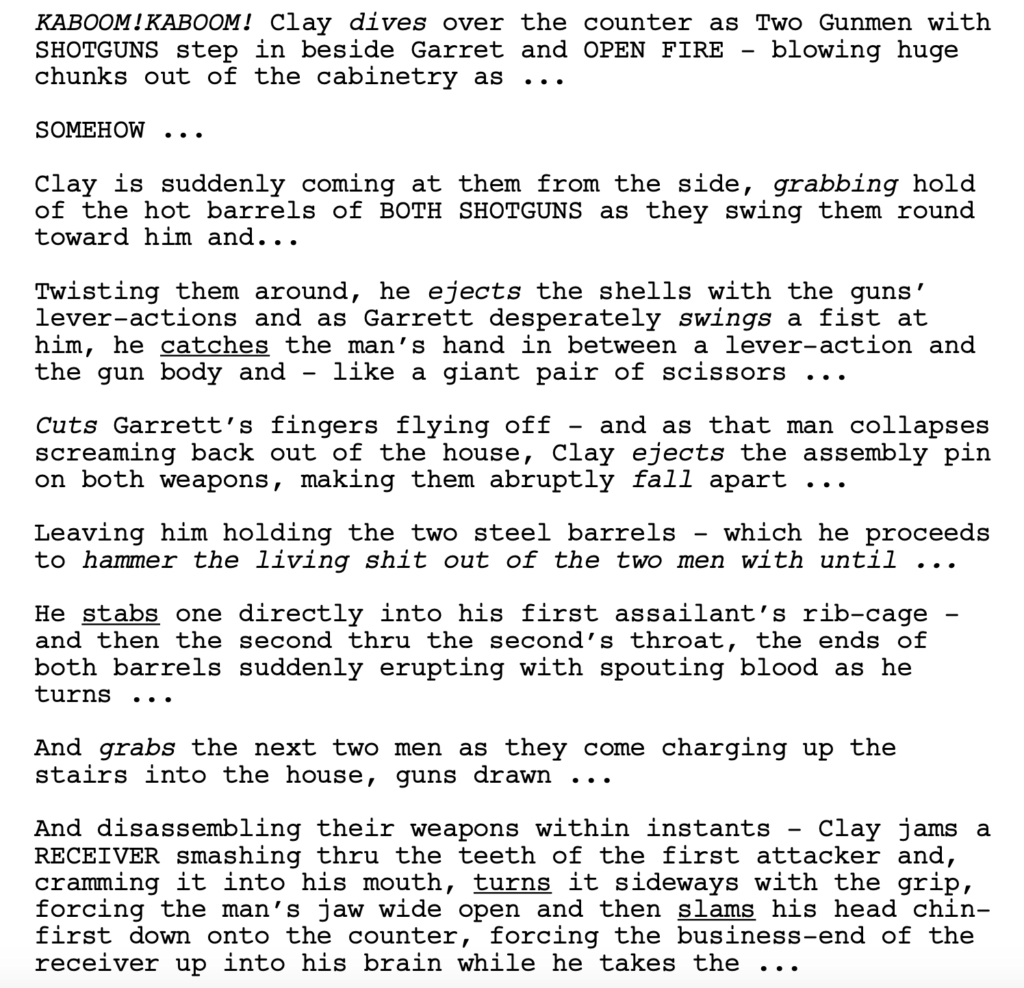
Clay then calls Westwyld and tells him he’s coming for him. It is then that Westwyld realizes he is not dealing with an ordinary man. He’s dealing with a “bee keeper.” No, not a bee keeper in the traditional sense. A type of secret agent that is so top secret not even the freaking president knows who he is. These beekepers are part of a larger “hive” who keep the country running by any means possible. I’ll let Westwyld explain…
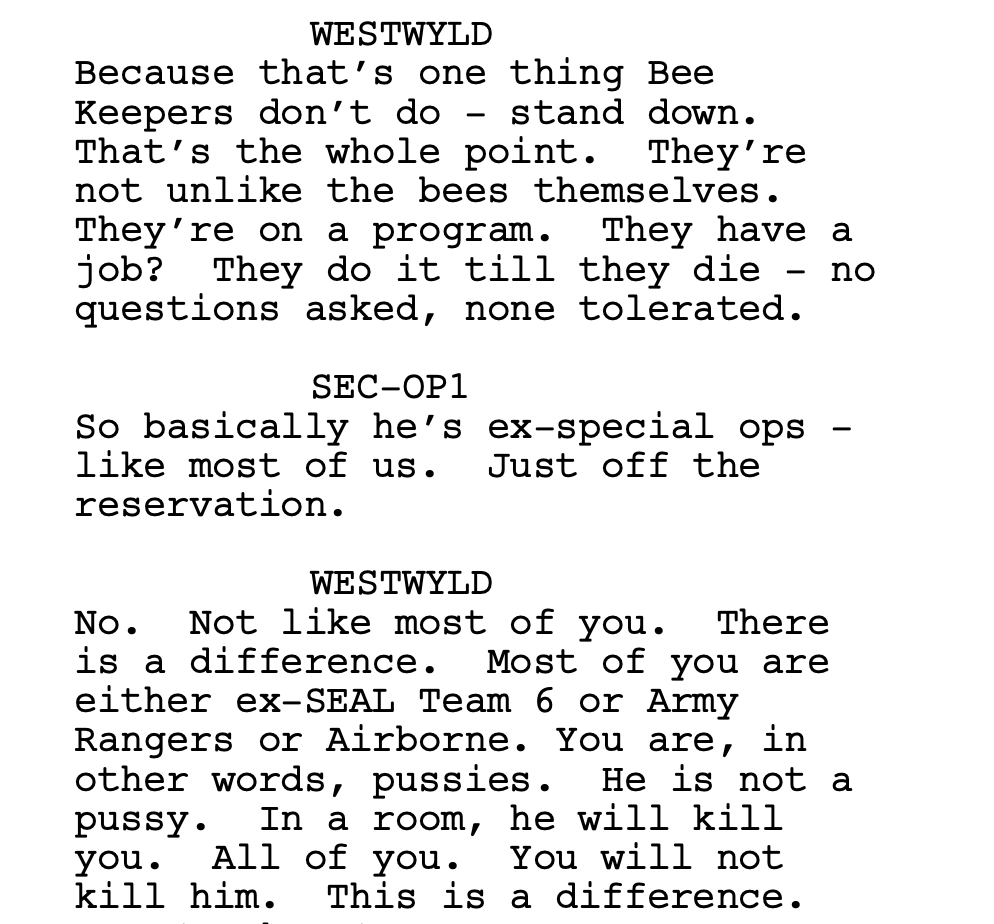
This forces Westwyld to ask for help from the Secretary of Defense! Who says that the only way to stop a bee keeper is with another bee keeper. Which they reluctantly agree to deploy. And this is where things get crazy, lol! When bee keepers fight each other, they use honey, they use bee puns, they use bee tactics. It is truly a marvel to behold. To say anything more about this script would be to betray the joy of reading it yourself. So find it and read it now! I’m sure someone in the comments can send it to you.
Hoooo-weee! I can’t remember the last time I forgot I was reading something. I totally forgot I was reading a script while reading Bee Keeper.
That’s because Kurt Wimmer is a master at writing spec scripts. And take note of the “spec” part of that declaration. There’s a difference between being great at writing a script and being great at writing a spec script. With a spec script, you have to keep a tighter grip on the reader. If you try to take your time and build something up for 15 pages without anything interesting happening in the meantime, you’ll lose the reader.
Wimmer understands this better than maybe any screenwriter in the business. Not only does he make sure each page keeps you reading. He makes sure before he’s even written a word that the concept and execution are going to create enough situations where he can keep you invested all the way through.
Beginner and even intermediate writers will decide to write a script with no idea if they can keep it entertaining the whole way through. They’re hoping they’ll figure it out “along the way.” Great screenwriters suss this stuff out ahead of time. Wimmer clearly did that here.
I don’t know why I’m surprised but I saw so many things here that were smart. For example, Wimmer does something really complicated in the screenwriting world with effortless ease. He has to make it make sense that Adam Clay will put his entire life on the line to get revenge on these people. And he has to do that through Adam’s connection with Eloise.
The problem is, he has to kill off Eloise quickly because she’s the inciting incident for the whole movie. Her death is what propels him to go on this journey. So he only has a brief amount of time to create a relationship between the two that emotionally resonates.
Complicating this is that you want to start these scripts off BIG. It’s an action-thriller. Starting with a character scene is not the best idea. So that was the puzzle Wimmer was challenged with solving.
What he did was he created this slow opening character scene between Clay and Eloise by inserting a problem – she had a wasps’ nest in her house. This allowed Clay, who’s a bee keeper, to come take care of it for her.
Now one of the tricks you can use to make a slow scene interesting is teaching us something interesting during it. Which is what Clay does. He explains what’s going on with the wasps. He tells us that wasps destroy beehives. Which is why it’s best to terminate them. We show him do some very technical interesting things to destroy the wasps’ nest, allowing us to both learn something cool and establish a relationship between these two so that we understand why he goes after the bad guys later.
On top of all this, we’re learning who our hero is. What he does.
The best scene-writing, especially in the first act, does multiple things at the same time. And Wimmer is doing that on expert-mode here. But he’s not just achieving that. He’s achieving it invisibly. We don’t see any of the mechanisms that are creating this effect because they’re seamless and invisible. That’s great writing.
He also does something really clever with the bad guys. Sometimes we can get lost in trying to create an interesting bad guy. But you can make that job a lot easier on yourself by doing what Wimmer does here – creating a villain with “built-in hate pedigree.” The villain is a scammer (everybody hates scammers) and not only that, but they target the elderly (everybody hates people who take advantage of the elderly).
So before we’ve even met our scammer, we hate him. And that does SO MUCH OF THE WORK FOR YOU when you write the script. Because if we hate the villain, we’ll almost want to keep reading to see them go down MORE than we want to see our hero achieve his goal.
I can’t emphasize this enough. The big secret hack when it comes to writing great screenplays is to make the reader feel EMOTION. Once you have a reader emotionally invested — actually, hold up, let me think about how to phrase this…
You know how when you meet someone who you really really like and want to be with? All you can think about is them and being around them? That’s because you’re emotionally hooked on that person. They’ve triggered you on an emotional level.
It’s the same idea with a screenplay. Just like you can’t convince a person to like you logically, you can’t convince a reader to like a script because you’ve done everything the proper way it’s supposed to be done.
You hook the reader by making them feel something. As strong as you can make them feel it. And we feel it here immediately when we have this nice old lady get taken advantage of by these terrible people. And we’re in! That’s it! We’re in. We want to see that person go down. Which is why this script works so well.
The rest is gravy. It’s a fun ride where this guy tries to kill the bad guys.
The only thing I didn’t like about this script was the idea that there was no recourse for someone illegally jacking into your bank account and transferring all of your money out of it without your permission. Especially when you consider that the woman’s daughter was a federal agent! Talk about kicking the hornet’s nest. The FBI would be able to take this enterprise down within 72 hours.
So I didn’t like that. But crazy enough, the writing was so darn amazing that I didn’t care. It was such a fun exciting and FUNNY ride. I loved this quirky concept of a bee keeper taking the bad guys down. It was so different. And the mastery of Wimmer just made it a dream read. Every screenwriter should read this script to see how to make their own scripts read. It’s truly impressive stuff.
[ ] What the hell did I just read?
[ ] wasn’t for me
[ ] worth the read
[x] impressive
[ ] genius
What I learned: This is a little dialogue trick I’ve learned that always works in scripts like this. The formula goes something like this. Your hero approaches one of their targets and runs into some foot soldiers (guards, heavies, in this case, security) and the foot soldiers ask what your hero is doing here. There’s a tendency to think logically about how your hero will answer that question. They might say, “I have an appointment here and I’m late.” Maybe he tricks them by calling a fake number and letting them talk to the person to “confirm” that he indeed has an appointment. But where’s the fun in that? Instead, when Adam Clay goes to the Data Group building and encounters security outside and they suspiciously ask him what he’s doing here, he responds, “If this is Data Group – the call center – I’m going inside. I’m going to burn it down.” In other words, have your hero say EXACTLY what he’s going to do. You can do this anywhere. If you’re writing a movie in the 1700s and a William Wallace like character walks up to the castle and the guards say, “What do you want?” “I’m planning on walking into your castle here, heading up to the king’s throne room, and gut him before cutting off his head and tossing it out the window.” I’m telling you, it works pretty much every time.
 Right Now #10: James Gunn – The strange thing about this choice is that I go back and forth on Gunn. I’ve appreciated him from afar, but he’s been hit or miss for me. Guardians of the Galaxy 2, for example, was one of the biggest disappointments I’ve had in a theater in a while. With that said, Gunn is one of the most unique writers out there and has an amazing ability to infuse genuine weirdness into big budget mainstream movies. Most big movies are paint-by-numbers. Gunn’s movies are never that. Guardians of the Galaxy literally has a talking raccoon who’s best friends with a tree. But the project that tipped the scales for me and put Gunn on this list was Peacemaker, which is probably going to end up being my favorite TV show of the year. The dialogue in that show is exceptional. And Gunn continues to execute one of the hardest skills in screenwriting, which is to create multiple memorable characters in a single show or movie. That’s the true test of a screenwriter – their ability to create characters who resonate with audiences. Any screenwriter who’s given this craft any time at all knows how hard that is to do, and James Gunn makes it look effortless time and time again. The man gave a full-on heartfelt arc to a character named Polka-Dot Man.
Right Now #10: James Gunn – The strange thing about this choice is that I go back and forth on Gunn. I’ve appreciated him from afar, but he’s been hit or miss for me. Guardians of the Galaxy 2, for example, was one of the biggest disappointments I’ve had in a theater in a while. With that said, Gunn is one of the most unique writers out there and has an amazing ability to infuse genuine weirdness into big budget mainstream movies. Most big movies are paint-by-numbers. Gunn’s movies are never that. Guardians of the Galaxy literally has a talking raccoon who’s best friends with a tree. But the project that tipped the scales for me and put Gunn on this list was Peacemaker, which is probably going to end up being my favorite TV show of the year. The dialogue in that show is exceptional. And Gunn continues to execute one of the hardest skills in screenwriting, which is to create multiple memorable characters in a single show or movie. That’s the true test of a screenwriter – their ability to create characters who resonate with audiences. Any screenwriter who’s given this craft any time at all knows how hard that is to do, and James Gunn makes it look effortless time and time again. The man gave a full-on heartfelt arc to a character named Polka-Dot Man.
 The Replacement: The Daniels – Just like Gunn, these guys have created a writing language unto themselves. They operate in a reality that’s in a different time and space from our own. I mean, a literal quote from one of them is: “Anyone can make a good movie out of a good idea. We like to take the worst idea possible and make a great movie out of that.” That would certainly explain Swiss Army Man, whose main character is a dead farting corpse. I just saw their latest film, Everything Everywhere All At Once, and I’m still processing it. It’s like a candy coated sundae at the world’s funnest funeral shoved into 500 years of philosophy dangled on top of every Dr. Seuss book ever written until it dissolves into fairy dust that perpetually falls on you wherever you go. But it isn’t just its weirdness that makes it great. It’s that the Daniels are so committed to character development that even if you stripped away all the movie’s shenanigans, you’d still have yourself one of the most heartfelt movies of the year. My only question with whether these two become stars befitting their talent or not is if they’ll play by the Hollywood handbook. The Daniels were not meant for notes. And any time you make one of these Hollywood movies, you’re going to get notes. But I think they’re so talented that they’ll find a way into the system, much like Gunn eventually did.
The Replacement: The Daniels – Just like Gunn, these guys have created a writing language unto themselves. They operate in a reality that’s in a different time and space from our own. I mean, a literal quote from one of them is: “Anyone can make a good movie out of a good idea. We like to take the worst idea possible and make a great movie out of that.” That would certainly explain Swiss Army Man, whose main character is a dead farting corpse. I just saw their latest film, Everything Everywhere All At Once, and I’m still processing it. It’s like a candy coated sundae at the world’s funnest funeral shoved into 500 years of philosophy dangled on top of every Dr. Seuss book ever written until it dissolves into fairy dust that perpetually falls on you wherever you go. But it isn’t just its weirdness that makes it great. It’s that the Daniels are so committed to character development that even if you stripped away all the movie’s shenanigans, you’d still have yourself one of the most heartfelt movies of the year. My only question with whether these two become stars befitting their talent or not is if they’ll play by the Hollywood handbook. The Daniels were not meant for notes. And any time you make one of these Hollywood movies, you’re going to get notes. But I think they’re so talented that they’ll find a way into the system, much like Gunn eventually did.
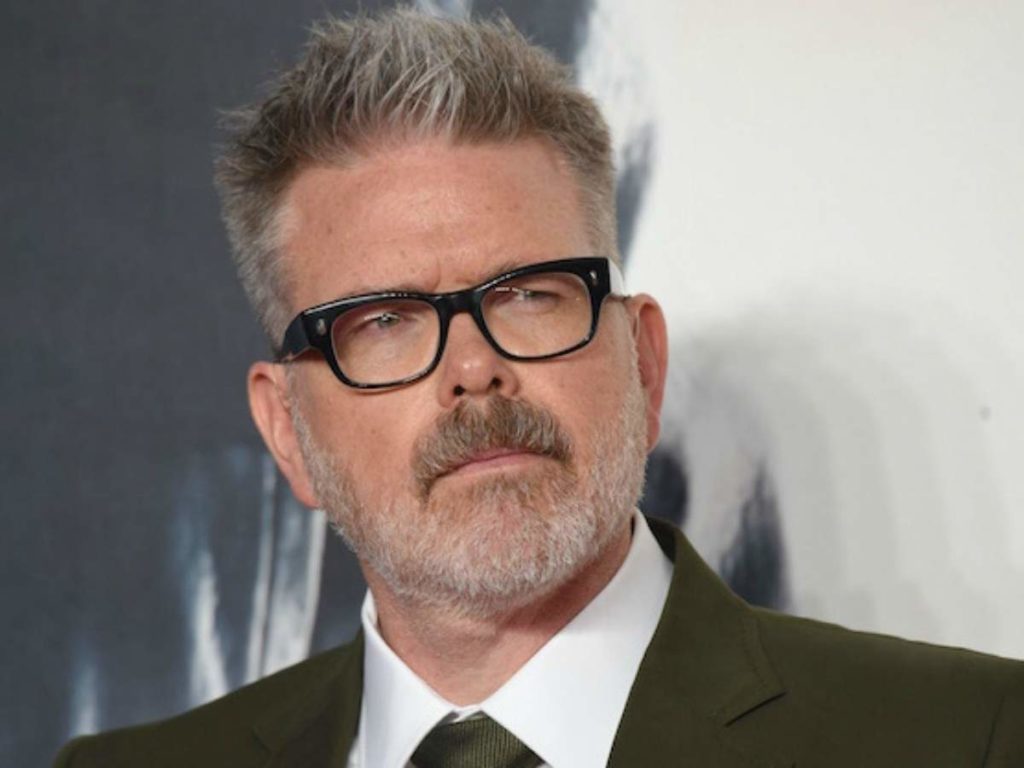 Right Now #9: Christopher McQuarrie – Who can deny McQuarrie’s track record. He won an Oscar (for The Usual Suspects) at just 27 years old. While he would go on to have a somewhat rocky decade after that Oscar win, his career was resurrected with 2008’s Valkyrie. That led to Jack Reacher and one of the 10 best sci-fi scripts ever written, Edge of Tomorrow. Since then he’s become the general for the Mission Impossible franchise. What McQuarrie brings to the table is an exceptional understanding of the screenwriting matrix, all the hundreds of little things that make a script work. For example, he knows that if two tough people are talking in a room, that the scene becomes infinitely more tense if one of them is cleaning a gun (scene from Jack Reacher). And I love that he continues to grow as a writer, always adding new skills. The most recent addition to his repertoire is his set piece writing. He’s a guy who looks to deconstruct the set piece so that you get what you want in a way you don’t expect. Take a look at the bathroom fight scene in Mission Impossible Fallout to see what I’m talking about. Finally, just as a personality, he kind of reminds me of the feisty writers of old. He’s got a little bit of Hemingway in him. He’s got a little bit of Eszterhas in him. I know this firsthand as he’s come after me a few times! I think the easiest way to determine who the best screenwriters are is to ask, if you had two million bucks to hire a screenwriter for your movie, who would you hire? If I were making a big action movie, I’m calling Christopher McQuarrie’s agent faster than you can say ‘slugline.’
Right Now #9: Christopher McQuarrie – Who can deny McQuarrie’s track record. He won an Oscar (for The Usual Suspects) at just 27 years old. While he would go on to have a somewhat rocky decade after that Oscar win, his career was resurrected with 2008’s Valkyrie. That led to Jack Reacher and one of the 10 best sci-fi scripts ever written, Edge of Tomorrow. Since then he’s become the general for the Mission Impossible franchise. What McQuarrie brings to the table is an exceptional understanding of the screenwriting matrix, all the hundreds of little things that make a script work. For example, he knows that if two tough people are talking in a room, that the scene becomes infinitely more tense if one of them is cleaning a gun (scene from Jack Reacher). And I love that he continues to grow as a writer, always adding new skills. The most recent addition to his repertoire is his set piece writing. He’s a guy who looks to deconstruct the set piece so that you get what you want in a way you don’t expect. Take a look at the bathroom fight scene in Mission Impossible Fallout to see what I’m talking about. Finally, just as a personality, he kind of reminds me of the feisty writers of old. He’s got a little bit of Hemingway in him. He’s got a little bit of Eszterhas in him. I know this firsthand as he’s come after me a few times! I think the easiest way to determine who the best screenwriters are is to ask, if you had two million bucks to hire a screenwriter for your movie, who would you hire? If I were making a big action movie, I’m calling Christopher McQuarrie’s agent faster than you can say ‘slugline.’
 The Replacement: Shay Hatten – Shay Hatten is the youngest screenwriter on this list, at just 28 years old. He broke through back in 2017 (at 23!), when his script about a coked up Stephen King trying to direct his first movie, Maximum Overdrive, made the Black List. A year later he wrote a killer fun script called Ballerina. That got him a job to write John Wick 3. He’s since written John Wick 4 and 5. Ballerina is going to get made. He wrote Army of the Dead for Zack Snyder and also Snyder’s newest film, Rebel Moon. This is the hot young screenwriter that everybody wants for their big action movie and he hasn’t hit 30 yet. Of all the the big future screenwriters on this list, Hatten may become the biggest of all. I don’t remember this level of success this early for a screenwriter since another “Sha” writer, Shane Black, came onto the scene. Not a bad screenwriter to be compared to.
The Replacement: Shay Hatten – Shay Hatten is the youngest screenwriter on this list, at just 28 years old. He broke through back in 2017 (at 23!), when his script about a coked up Stephen King trying to direct his first movie, Maximum Overdrive, made the Black List. A year later he wrote a killer fun script called Ballerina. That got him a job to write John Wick 3. He’s since written John Wick 4 and 5. Ballerina is going to get made. He wrote Army of the Dead for Zack Snyder and also Snyder’s newest film, Rebel Moon. This is the hot young screenwriter that everybody wants for their big action movie and he hasn’t hit 30 yet. Of all the the big future screenwriters on this list, Hatten may become the biggest of all. I don’t remember this level of success this early for a screenwriter since another “Sha” writer, Shane Black, came onto the scene. Not a bad screenwriter to be compared to.
 Right Now #8: Jordan Peele – Am I still so blown away by the amazing script for Get Out that I can’t see Peele’s work objectively? Maybe. But let me explain why I included Peele. First, he celebrates the big juicy high concept idea like no other. And to me, the big juicy high concept idea is the heart and soul of the movie business. It’s that “what if” idea that’s led to so many of the most memorable experiences of my life. And two, Peele is one of only a handful of writers who can get people revved up about a movie that isn’t gigantic studio-owned IP. He has access to that rare vein that goes from his brain directly to the zeitgeist. Guys like Spielberg had it. M. Night had it for a brief period. JJ had it. Anyone who gains access to this vein is a best-of contender. If I were Peele, though, I would take a page out of Tarantino’s book and make a movie once every three years instead of once every other year. Also, get out of the TV business. You’re not seriously dedicating yourself to it so it’s only stealing time away from writing new drafts of your feature scripts. “Us” was three to four drafts away from being a horror classic. You would’ve had the time to write those drafts had you not been producing questionable television like, “Weird City.” Despite this, I remain a Peele fan. We’re just a couple of months away from “Nope.” That movie will prove whether I’m right or wrong about including Peele on this list.
Right Now #8: Jordan Peele – Am I still so blown away by the amazing script for Get Out that I can’t see Peele’s work objectively? Maybe. But let me explain why I included Peele. First, he celebrates the big juicy high concept idea like no other. And to me, the big juicy high concept idea is the heart and soul of the movie business. It’s that “what if” idea that’s led to so many of the most memorable experiences of my life. And two, Peele is one of only a handful of writers who can get people revved up about a movie that isn’t gigantic studio-owned IP. He has access to that rare vein that goes from his brain directly to the zeitgeist. Guys like Spielberg had it. M. Night had it for a brief period. JJ had it. Anyone who gains access to this vein is a best-of contender. If I were Peele, though, I would take a page out of Tarantino’s book and make a movie once every three years instead of once every other year. Also, get out of the TV business. You’re not seriously dedicating yourself to it so it’s only stealing time away from writing new drafts of your feature scripts. “Us” was three to four drafts away from being a horror classic. You would’ve had the time to write those drafts had you not been producing questionable television like, “Weird City.” Despite this, I remain a Peele fan. We’re just a couple of months away from “Nope.” That movie will prove whether I’m right or wrong about including Peele on this list.
 The Replacement: Emerald Fennell – Was it Kathleen Kennedy who got a lot of flack for saying, “The Future is Female?” I think she was just echoing what everyone in the studio hallways were already saying. Indeed, there are some killer female screenwriters on the rise. Emerald Fennell probably wrote the best script (Promising Young Woman) I read in 2019, when it made the Black List. Just like Jordan Peele provided us with those ‘wow’ moments in Get Out, so did Fennel In “Promising.” That opening scene when our drunk main character instantly sobers up still gives me shivers. It shouldn’t be surprising, then, that Fennell was recruited into the DC universe as soon as Promising Young Woman hit theaters. She will write the origin story of Zantanna, a female magician who is known to appear in the Justice League Dark series (that of which JJ Abrams is shepherding). Fennell’s voice is so distinct that I can’t imagine a future where she isn’t a writing superstar.
The Replacement: Emerald Fennell – Was it Kathleen Kennedy who got a lot of flack for saying, “The Future is Female?” I think she was just echoing what everyone in the studio hallways were already saying. Indeed, there are some killer female screenwriters on the rise. Emerald Fennell probably wrote the best script (Promising Young Woman) I read in 2019, when it made the Black List. Just like Jordan Peele provided us with those ‘wow’ moments in Get Out, so did Fennel In “Promising.” That opening scene when our drunk main character instantly sobers up still gives me shivers. It shouldn’t be surprising, then, that Fennell was recruited into the DC universe as soon as Promising Young Woman hit theaters. She will write the origin story of Zantanna, a female magician who is known to appear in the Justice League Dark series (that of which JJ Abrams is shepherding). Fennell’s voice is so distinct that I can’t imagine a future where she isn’t a writing superstar.
 Right Now #7: The Coen Bros – I went back and forth on whether to include this dynamic duo because while they’ve had an amazing career, which includes two screenwriting Oscars, they haven’t had a hit movie in over a decade. Even the recently announced “Drive Away Dykes,” which was hilarious, is a script Ethan and his wife wrote 15 years ago. The thing that tipped the scales for me, however, was their 2018 Netflix collection of shorts, The Ballad of Buster Scruggs. There are three genius short films in that collection (The Ballad of Buster Scruggs, Meal Ticket, and The Gal Who Got Rattled), all of which are exceptionally written. It reminded me that the Coens can still take over a game whenever they want to. Plus it’s hard to think of any writers who can go toe-to-toe with these guys in a screenwriting challenge. They’re always going to write you a stand-out character. They’re always going to come up with the most unique way into a scene. They’re always going to take things in a direction you didn’t think they were going to go in. You bet your screenwriting tushy they’re one of the ten best.
Right Now #7: The Coen Bros – I went back and forth on whether to include this dynamic duo because while they’ve had an amazing career, which includes two screenwriting Oscars, they haven’t had a hit movie in over a decade. Even the recently announced “Drive Away Dykes,” which was hilarious, is a script Ethan and his wife wrote 15 years ago. The thing that tipped the scales for me, however, was their 2018 Netflix collection of shorts, The Ballad of Buster Scruggs. There are three genius short films in that collection (The Ballad of Buster Scruggs, Meal Ticket, and The Gal Who Got Rattled), all of which are exceptionally written. It reminded me that the Coens can still take over a game whenever they want to. Plus it’s hard to think of any writers who can go toe-to-toe with these guys in a screenwriting challenge. They’re always going to write you a stand-out character. They’re always going to come up with the most unique way into a scene. They’re always going to take things in a direction you didn’t think they were going to go in. You bet your screenwriting tushy they’re one of the ten best.
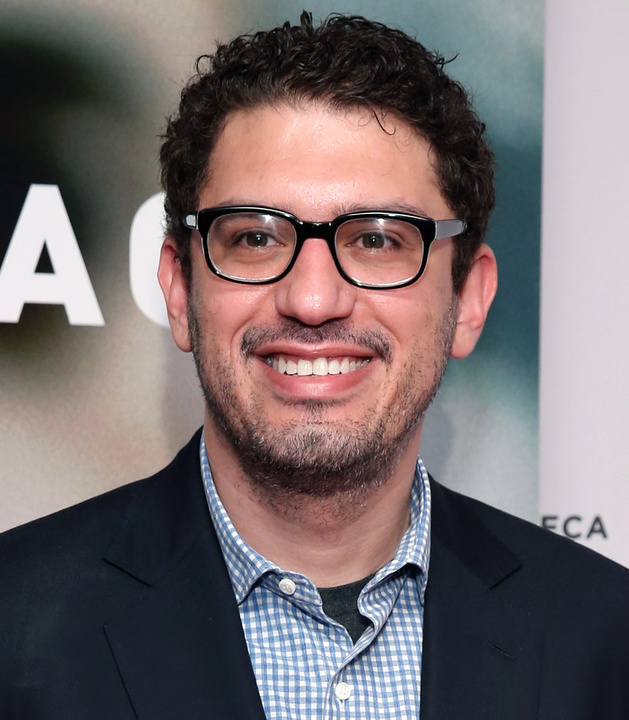 The Replacement: Sam Esmail – I was impressed with Sam’s screenwriting long before he broke onto the scene with Mr. Robot. He just always had interesting concepts and played with screenwriting formula in interesting ways. Much like the Coens, you never truly knew where his stories were going. And I like that Sam is always looking forward, trying to find the hot new thing. When everyone else was staring at podcasts cross-eyed, it was Esmail who, hot off the success of Mr. Robot, decided to adapt podcast, “Homecoming,” for Amazon Prime. The show was a hit for Amazon and even got Julia Roberts to commit to her first TV starring role. Up next he has the high concept, “Leave the World Behind,” which I recently reviewed on the site. Esmail is going to be a force for a long time to come.
The Replacement: Sam Esmail – I was impressed with Sam’s screenwriting long before he broke onto the scene with Mr. Robot. He just always had interesting concepts and played with screenwriting formula in interesting ways. Much like the Coens, you never truly knew where his stories were going. And I like that Sam is always looking forward, trying to find the hot new thing. When everyone else was staring at podcasts cross-eyed, it was Esmail who, hot off the success of Mr. Robot, decided to adapt podcast, “Homecoming,” for Amazon Prime. The show was a hit for Amazon and even got Julia Roberts to commit to her first TV starring role. Up next he has the high concept, “Leave the World Behind,” which I recently reviewed on the site. Esmail is going to be a force for a long time to come.
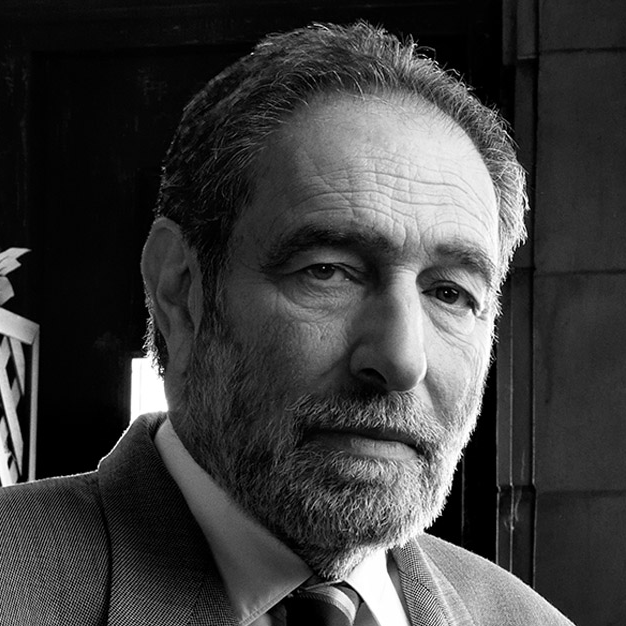 Right Now #6: Eric Roth – Roth has an incredible resume that includes films like Forrest Gump, Benjamin Button, A Star is Born, Dune, Ali, and Munich. But that isn’t even a fraction of the number of unproduced projects he’s written that haven’t been made yet. He’s the first guy the studios call when they have a big movie that needs a level of gravitas, gravitas these candy-coated Marvel screenwriters couldn’t find if they were placed in the middle of the Library of Alexandria. Roth’s secret sauce is his unique approach to screenwriting. As he was never formally taught (there were no screenwriting books published when he started), he doesn’t write with structure or character arcs or dialogue tricks in mind. He writes completely on instinct. When asked what he does when he runs into a story problem, Roth famously answered, “I change the weather.” This is why you rarely feel any gears grinding beneath a Roth script. They’re written on gut and therefore there’s no artificial sweetener giving the story that stale aftertaste. His creativity goes directly from his mind to the page without stopping. There’s nobody out there like Roth. Nobody.
Right Now #6: Eric Roth – Roth has an incredible resume that includes films like Forrest Gump, Benjamin Button, A Star is Born, Dune, Ali, and Munich. But that isn’t even a fraction of the number of unproduced projects he’s written that haven’t been made yet. He’s the first guy the studios call when they have a big movie that needs a level of gravitas, gravitas these candy-coated Marvel screenwriters couldn’t find if they were placed in the middle of the Library of Alexandria. Roth’s secret sauce is his unique approach to screenwriting. As he was never formally taught (there were no screenwriting books published when he started), he doesn’t write with structure or character arcs or dialogue tricks in mind. He writes completely on instinct. When asked what he does when he runs into a story problem, Roth famously answered, “I change the weather.” This is why you rarely feel any gears grinding beneath a Roth script. They’re written on gut and therefore there’s no artificial sweetener giving the story that stale aftertaste. His creativity goes directly from his mind to the page without stopping. There’s nobody out there like Roth. Nobody.
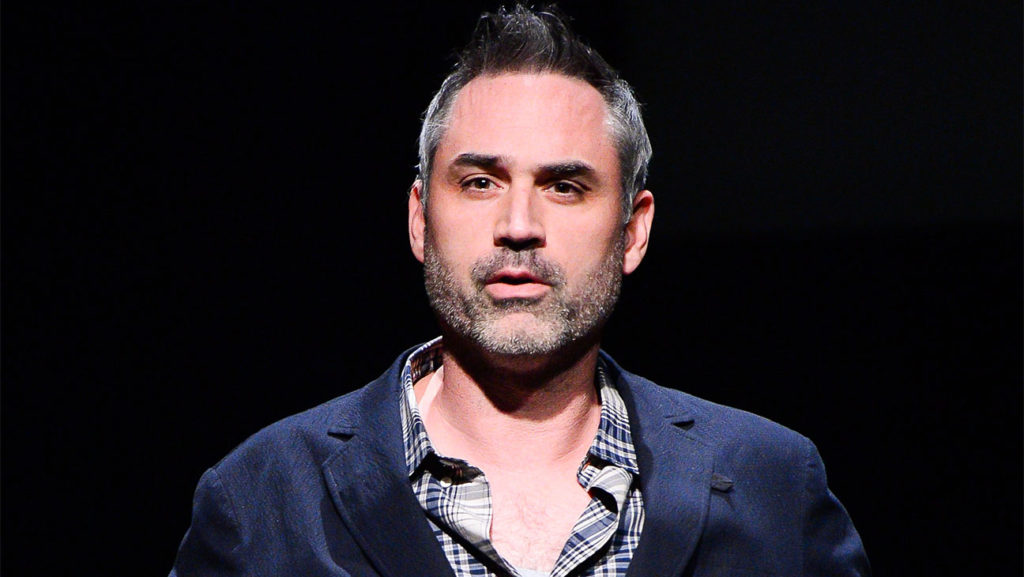 The Replacement: Alex Garland – One of the ways you identify the truly good writers is that when you read their scripts, they feel unlike anything else out there. Garland’s reflective tortured stories exhibit a pain that goes way deeper than your average screenplay. Check out Devs on Hulu if you want a dose of this. Garland manages to transition the series’ central villain, tech giant, Forest, into its protagonist by the end of the show. It’s these types of weird industry-challenging creative choices that make Garland’s work so powerful. He’s thoughtful. He’s calculated. He’s brave. He might be the most intelligent person on this list. I know it’s weird to include a 51 year old on any “future of” list, but ever since Garland started taking control of his career as a writer-director (something he did not do because he wanted to direct, but rather he realized it was the only way to protect his writing), he’s elevated himself to a new level. His next film, “Men,” looks creepy as hell. After that, he’ll be tackling a movie about civil war in the US.
The Replacement: Alex Garland – One of the ways you identify the truly good writers is that when you read their scripts, they feel unlike anything else out there. Garland’s reflective tortured stories exhibit a pain that goes way deeper than your average screenplay. Check out Devs on Hulu if you want a dose of this. Garland manages to transition the series’ central villain, tech giant, Forest, into its protagonist by the end of the show. It’s these types of weird industry-challenging creative choices that make Garland’s work so powerful. He’s thoughtful. He’s calculated. He’s brave. He might be the most intelligent person on this list. I know it’s weird to include a 51 year old on any “future of” list, but ever since Garland started taking control of his career as a writer-director (something he did not do because he wanted to direct, but rather he realized it was the only way to protect his writing), he’s elevated himself to a new level. His next film, “Men,” looks creepy as hell. After that, he’ll be tackling a movie about civil war in the US.
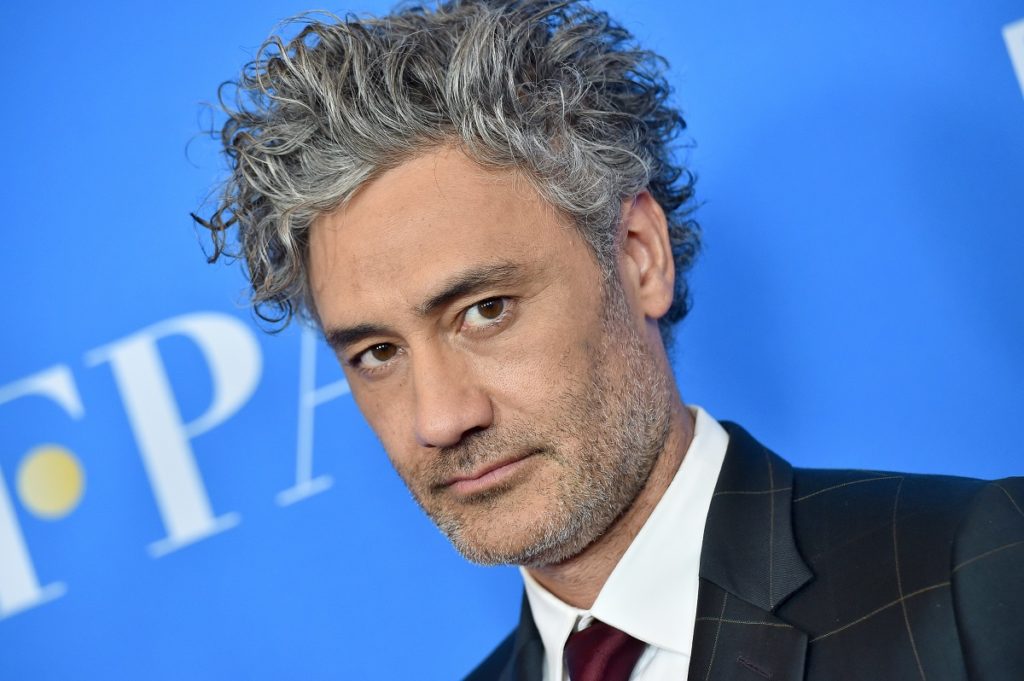 Right Now #5: Taika Waititi – If there’s a theme to today’s screenwriting superheroes, it’s that they all have their own unique voice. Voice, as a reminder to newbies, is the unique personality a writer inserts into both his prose and the story itself, and almost always centers around the writer’s unique brand of humor. Taika arguably uses humor in a more interesting way than all of today’s writers. Just look at what he does with Hitler in JoJo Rabbit. A quick diversion if you will allow me: Whenever I read a great screenplay, the movie never lives up to it. For that reason, I’ve gotten into the habit of avoiding watching movies for scripts I loved. This is what I did when JoJo Rabbit came out. I said, the movie can’t possibly be as good as the screenplay, which I felt was perfect. So I didn’t see the movie when it came out. I didn’t see the movie when it came to digital either. I’d honestly planned on never seeing it. But one day it popped up on a streaming service and I thought, what the hell. JoJo Rabbit turned out to be the only film I’ve watched where the movie was actually better than the great screenplay. I was fucking bawling by the end of that movie even though I knew everything that was going to happen. Such is the effect Taika has on me. Between the feature version of What We Do In the Shadows to Hunt for the Wilderpeople to his older stuff like Eagle Vs. Shark, this guy is a superstar. And now that Hollywood has given him the keys to the city, we’re going to see just how high his star can rise. Next up on his list? Saving Star Wars!
Right Now #5: Taika Waititi – If there’s a theme to today’s screenwriting superheroes, it’s that they all have their own unique voice. Voice, as a reminder to newbies, is the unique personality a writer inserts into both his prose and the story itself, and almost always centers around the writer’s unique brand of humor. Taika arguably uses humor in a more interesting way than all of today’s writers. Just look at what he does with Hitler in JoJo Rabbit. A quick diversion if you will allow me: Whenever I read a great screenplay, the movie never lives up to it. For that reason, I’ve gotten into the habit of avoiding watching movies for scripts I loved. This is what I did when JoJo Rabbit came out. I said, the movie can’t possibly be as good as the screenplay, which I felt was perfect. So I didn’t see the movie when it came out. I didn’t see the movie when it came to digital either. I’d honestly planned on never seeing it. But one day it popped up on a streaming service and I thought, what the hell. JoJo Rabbit turned out to be the only film I’ve watched where the movie was actually better than the great screenplay. I was fucking bawling by the end of that movie even though I knew everything that was going to happen. Such is the effect Taika has on me. Between the feature version of What We Do In the Shadows to Hunt for the Wilderpeople to his older stuff like Eagle Vs. Shark, this guy is a superstar. And now that Hollywood has given him the keys to the city, we’re going to see just how high his star can rise. Next up on his list? Saving Star Wars!
 The Replacement: Phoebe Waller-Bridge – Okay, so I admit this is a little confusing because Taika’s probably going to be around for a while. But sticking with the theme of our list, we have to provide him with a replacement, and what better replacement than Waller-Bridge? Like Taika, Waller-Bridge’s writing effortlessly shifts between making you spit-take and making you cry your eyes out. Go watch the opening scene of Fleabag Season 1 then the first episode of Season 2 to see what I’m talking about. After Waller-Bridge’s shockingly open introduction into her titular character’s sex life, we get an episode that contains a secret miscarriage during a family dinner. Waller-Bridge had one of those rare double-hit debuts, when she came out with both Fleabag and Killing Eve at the same time. Now she’s got two new big shows coming up, Mr & Mrs Smith and her next under-wraps Amazon show.
The Replacement: Phoebe Waller-Bridge – Okay, so I admit this is a little confusing because Taika’s probably going to be around for a while. But sticking with the theme of our list, we have to provide him with a replacement, and what better replacement than Waller-Bridge? Like Taika, Waller-Bridge’s writing effortlessly shifts between making you spit-take and making you cry your eyes out. Go watch the opening scene of Fleabag Season 1 then the first episode of Season 2 to see what I’m talking about. After Waller-Bridge’s shockingly open introduction into her titular character’s sex life, we get an episode that contains a secret miscarriage during a family dinner. Waller-Bridge had one of those rare double-hit debuts, when she came out with both Fleabag and Killing Eve at the same time. Now she’s got two new big shows coming up, Mr & Mrs Smith and her next under-wraps Amazon show.
 Right Now #4: Christopher Nolan – While people have had legitimate gripes with Nolan’s writing, which can vacillate between bombastic and over-expository, he remains one of a select few who can write an original idea with absolutely zero ties to IP, and get 200 million dollars to make it. Trust me, we don’t want to live in a world where that gets taken away. Because that means the only big-budget movies we’ll get are Marvel, DC, Fast and Furious, and Star Wars. If you’re okay with that, fine. I’m not. Despite his missteps, I still think Nolan is the number one writer in the world for exploring big ideas. From Memento to The Prestige to Inception, he takes these gigantic concepts and plays with them in such interesting ways. I love, for example, that he didn’t stop in Inception at one dream. That you could go to dreams within dreams. It’s that sort of dedication to concept exploration that sets Nolan apart. And, to this day, I still think Memento is a Top 5 ever screenplay. I went back and watched it recently and the complex narrative is so cleverly simplified. Nolan is definitely a superstar.
Right Now #4: Christopher Nolan – While people have had legitimate gripes with Nolan’s writing, which can vacillate between bombastic and over-expository, he remains one of a select few who can write an original idea with absolutely zero ties to IP, and get 200 million dollars to make it. Trust me, we don’t want to live in a world where that gets taken away. Because that means the only big-budget movies we’ll get are Marvel, DC, Fast and Furious, and Star Wars. If you’re okay with that, fine. I’m not. Despite his missteps, I still think Nolan is the number one writer in the world for exploring big ideas. From Memento to The Prestige to Inception, he takes these gigantic concepts and plays with them in such interesting ways. I love, for example, that he didn’t stop in Inception at one dream. That you could go to dreams within dreams. It’s that sort of dedication to concept exploration that sets Nolan apart. And, to this day, I still think Memento is a Top 5 ever screenplay. I went back and watched it recently and the complex narrative is so cleverly simplified. Nolan is definitely a superstar.
 The Replacement: Greta Gerwig – What’s the secondary theme of this list? The future is female! Here we have Nolan, his hard edges, his big handsome male movie stars, his love of guys expressing themselves externally, in the most masculine of ways. And on the other end of the spectrum we’ve got Greta Gerwig, with her soft feminine approach to storytelling. She focuses on the internal, on the angst and emotions going on inside the individual. You can’t discount the one two punch of Ladybird and Little Women, both of which had major awards pushes. Gerwig’s melancholy view of existence feels right for anyone who’s been overwhelmed by the demands of day-to-day life. Since those two films, Hollywood has now gone all in on Greta, giving her access to the single most feminine property in Hollywood – Barbie. I don’t know what’s going to happen with Barbie. I’d be lying if I said it didn’t have the potential to be disastrous. But what that tells me is if Greta pulls a “Lord and Miller” and makes a great movie out of subpar subject matter, she will truly be one of the most powerful forces Hollywood.
The Replacement: Greta Gerwig – What’s the secondary theme of this list? The future is female! Here we have Nolan, his hard edges, his big handsome male movie stars, his love of guys expressing themselves externally, in the most masculine of ways. And on the other end of the spectrum we’ve got Greta Gerwig, with her soft feminine approach to storytelling. She focuses on the internal, on the angst and emotions going on inside the individual. You can’t discount the one two punch of Ladybird and Little Women, both of which had major awards pushes. Gerwig’s melancholy view of existence feels right for anyone who’s been overwhelmed by the demands of day-to-day life. Since those two films, Hollywood has now gone all in on Greta, giving her access to the single most feminine property in Hollywood – Barbie. I don’t know what’s going to happen with Barbie. I’d be lying if I said it didn’t have the potential to be disastrous. But what that tells me is if Greta pulls a “Lord and Miller” and makes a great movie out of subpar subject matter, she will truly be one of the most powerful forces Hollywood.
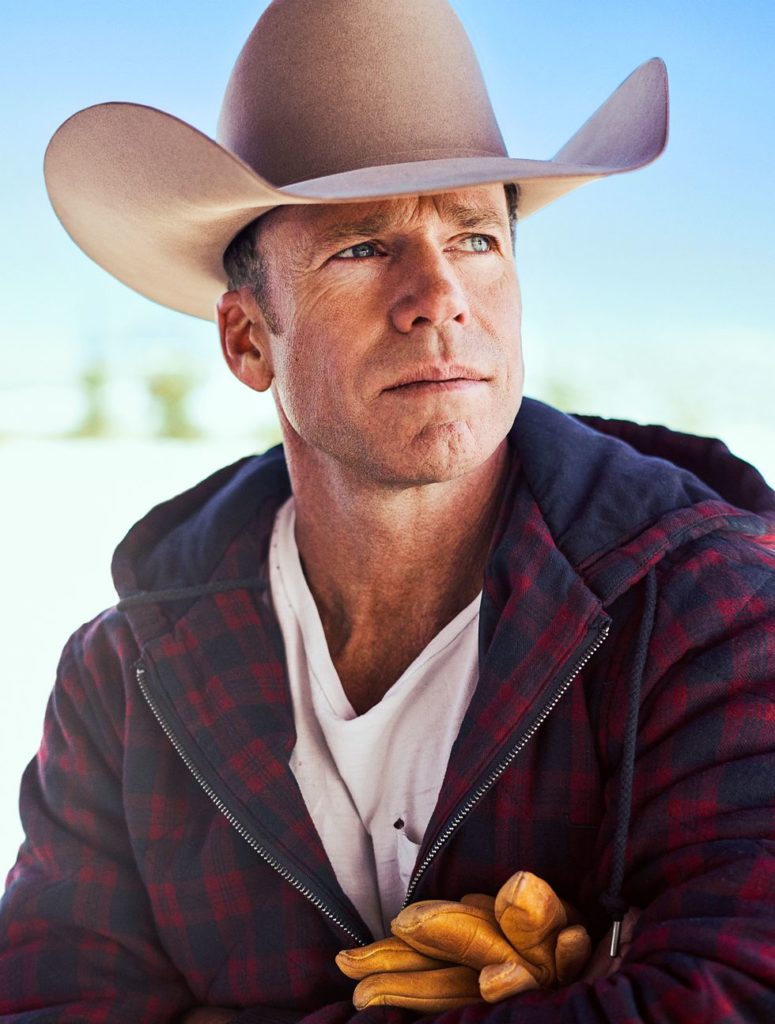 Right Now #3: Taylor Sheridan – Not unlike Nolan, Sheridan recognized that as the culture shifted, there was an opportunity to exploit the counter-culture. As Hollywood sprinted towards social issues and politically correct causes, an avenue for masculinity in its purest form became available. That is the DNA of Sheridan’s success. He gives you back the heroes of yesteryear, men who were traumatized by wars as opposed to tweets. While Hell or High Water is the screenplay that put him on the map, and Sicario the movie that first introduced us to his back-to-basics American perspective, it’s been his growing Yellowstone empire at Paramount that is making him one of the most formidable players in show business. Think about that for a second. Taylor Sheridan went from a nobody to a Hollywood titan IN JUST SEVEN YEARS! That’s how long it took him from his Black List debut. Sheridan’s rise is also a look into the future of writing. Sheridan started out with features but eventually moved to the much more lucrative world of television. It isn’t Sicario that’s going to put him in the 9 figure earning bracket. It’s Yellowstone. It’s why I couldn’t ignore television when curating this list.
Right Now #3: Taylor Sheridan – Not unlike Nolan, Sheridan recognized that as the culture shifted, there was an opportunity to exploit the counter-culture. As Hollywood sprinted towards social issues and politically correct causes, an avenue for masculinity in its purest form became available. That is the DNA of Sheridan’s success. He gives you back the heroes of yesteryear, men who were traumatized by wars as opposed to tweets. While Hell or High Water is the screenplay that put him on the map, and Sicario the movie that first introduced us to his back-to-basics American perspective, it’s been his growing Yellowstone empire at Paramount that is making him one of the most formidable players in show business. Think about that for a second. Taylor Sheridan went from a nobody to a Hollywood titan IN JUST SEVEN YEARS! That’s how long it took him from his Black List debut. Sheridan’s rise is also a look into the future of writing. Sheridan started out with features but eventually moved to the much more lucrative world of television. It isn’t Sicario that’s going to put him in the 9 figure earning bracket. It’s Yellowstone. It’s why I couldn’t ignore television when curating this list.
 The Replacement: Christy Hall – Uh, Carson. What could Christy Hall and Taylor Sheridan possibly have in common? First off, for those who don’t know who Christy Hall is, she came onto the scene in 2017 when her script, Daddio, finished in the top 10 of that year’s Black List. The script, about a conversation that occurs between a passenger and a taxi driver from the airport to the hotel, is one of the most honest genuine realistic scripts I’ve ever read. It’s almost as if it was transcribed from a real cab ride. Hall followed that up with the most controversial script of 2018, “Get Home Safe,” a nuclear attack on toxic masculinity. And that, my friends, is why I paired her up with Sheridan. Hollywood would prefer to hide any celebration of masculinity going forward. It wants femininity, especially the kind Hall brings to the table, the kind that isn’t afraid to poke, push, prod, and provoke. Get Home Safe was like the screenwriting national anthem for pissing off dudes. Am I fan of that type of writing? Not really. I’m one of those “dudes.” But I can’t deny the fact that Hall is amazingly talented and in our push, as an industry, to become as divisive as possible, Hall is the poster woman for these types of stories. Her first big credit was Netflix’s, “I Am Not Okay With This,” a unique take on the superhero genre. Next up she’s got Kat Coiro’s (She-Hulk), “The Husband’s Secret,” which will star Blake Lively.
The Replacement: Christy Hall – Uh, Carson. What could Christy Hall and Taylor Sheridan possibly have in common? First off, for those who don’t know who Christy Hall is, she came onto the scene in 2017 when her script, Daddio, finished in the top 10 of that year’s Black List. The script, about a conversation that occurs between a passenger and a taxi driver from the airport to the hotel, is one of the most honest genuine realistic scripts I’ve ever read. It’s almost as if it was transcribed from a real cab ride. Hall followed that up with the most controversial script of 2018, “Get Home Safe,” a nuclear attack on toxic masculinity. And that, my friends, is why I paired her up with Sheridan. Hollywood would prefer to hide any celebration of masculinity going forward. It wants femininity, especially the kind Hall brings to the table, the kind that isn’t afraid to poke, push, prod, and provoke. Get Home Safe was like the screenwriting national anthem for pissing off dudes. Am I fan of that type of writing? Not really. I’m one of those “dudes.” But I can’t deny the fact that Hall is amazingly talented and in our push, as an industry, to become as divisive as possible, Hall is the poster woman for these types of stories. Her first big credit was Netflix’s, “I Am Not Okay With This,” a unique take on the superhero genre. Next up she’s got Kat Coiro’s (She-Hulk), “The Husband’s Secret,” which will star Blake Lively.
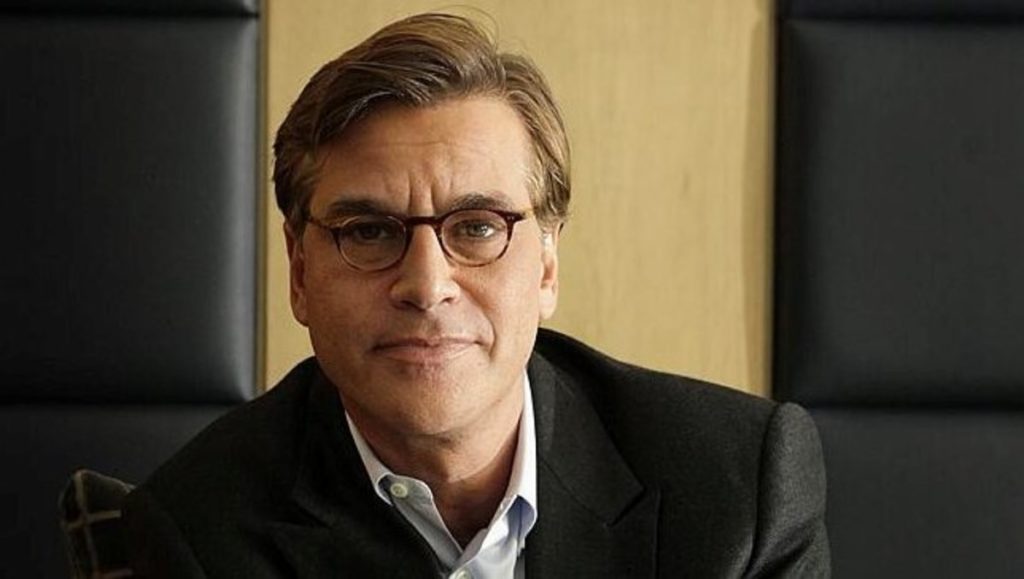 Right Now #2: Aaron Sorkin – Is there anyone else on the planet who can make a 180 page script read like it’s 90 pages? Sorkin, who’s a playwright at heart, eschews the belief that movies should be about showing and not telling. Instead, whether it’s on purpose or not, Sorkin tells, tells, and then tells some more. Of course, when your dialogue is as good as Sorkin’s, it’s easy to break the most harrowed rule in screenwriting. I’m sure some will say Sorkin’s passed his ‘used by’ date but I think as long as this guy is writing, he’s one of the best. Both Steve Jobs and Molly’s Game are decidedly underrated scripts. To date, Steve Jobs is probably the most clever biopic ever written. The choice to condense Jobs’s life into his three biggest Apple presentations was a stroke of genius. If there’s a knock on Sorkin, it’s that his scripts tend to feel the same. Lots of walking and talking. They have a very “play”-like feel to them. But dude, come on. Who doesn’t want to read the next Aaron Sorkin script? His scripts are literal teaching manuals for how to approach dialogue. Hell yeah Sorkin makes this list.
Right Now #2: Aaron Sorkin – Is there anyone else on the planet who can make a 180 page script read like it’s 90 pages? Sorkin, who’s a playwright at heart, eschews the belief that movies should be about showing and not telling. Instead, whether it’s on purpose or not, Sorkin tells, tells, and then tells some more. Of course, when your dialogue is as good as Sorkin’s, it’s easy to break the most harrowed rule in screenwriting. I’m sure some will say Sorkin’s passed his ‘used by’ date but I think as long as this guy is writing, he’s one of the best. Both Steve Jobs and Molly’s Game are decidedly underrated scripts. To date, Steve Jobs is probably the most clever biopic ever written. The choice to condense Jobs’s life into his three biggest Apple presentations was a stroke of genius. If there’s a knock on Sorkin, it’s that his scripts tend to feel the same. Lots of walking and talking. They have a very “play”-like feel to them. But dude, come on. Who doesn’t want to read the next Aaron Sorkin script? His scripts are literal teaching manuals for how to approach dialogue. Hell yeah Sorkin makes this list.
 The Replacement: Jesse Armstrong – This might be the biggest no-brainer in the history of lists. Jesse Armstrong, the writer of Succession, whose first two seasons of that show were two of the best seasons of television in the last ten years, probably owes his recent rise to Sorkin. They love to play in that same walking-and-talking powerful people conversing sandbox. The one big difference is that while Sorkin leans towards sweet, Armstrong bathes in salty. He is the king of the expletive-laden insult. Now my British audience will laugh at this pick as Armstrong has 30-some writing credits dating back to 2000. One of those, Peep Show, is iconic over the pond. The future? Really, Carson? But sometimes it takes a while for a writer to find their calling, to hit their breakout “zeitgeist” show. And once you do, you become a force. Armstrong will now try something different as his next project is a movie starring Michael Cera called, “Jonty,” about a coddled kid who joins forces with an old friend to produce a terrible Broadway play.
The Replacement: Jesse Armstrong – This might be the biggest no-brainer in the history of lists. Jesse Armstrong, the writer of Succession, whose first two seasons of that show were two of the best seasons of television in the last ten years, probably owes his recent rise to Sorkin. They love to play in that same walking-and-talking powerful people conversing sandbox. The one big difference is that while Sorkin leans towards sweet, Armstrong bathes in salty. He is the king of the expletive-laden insult. Now my British audience will laugh at this pick as Armstrong has 30-some writing credits dating back to 2000. One of those, Peep Show, is iconic over the pond. The future? Really, Carson? But sometimes it takes a while for a writer to find their calling, to hit their breakout “zeitgeist” show. And once you do, you become a force. Armstrong will now try something different as his next project is a movie starring Michael Cera called, “Jonty,” about a coddled kid who joins forces with an old friend to produce a terrible Broadway play.
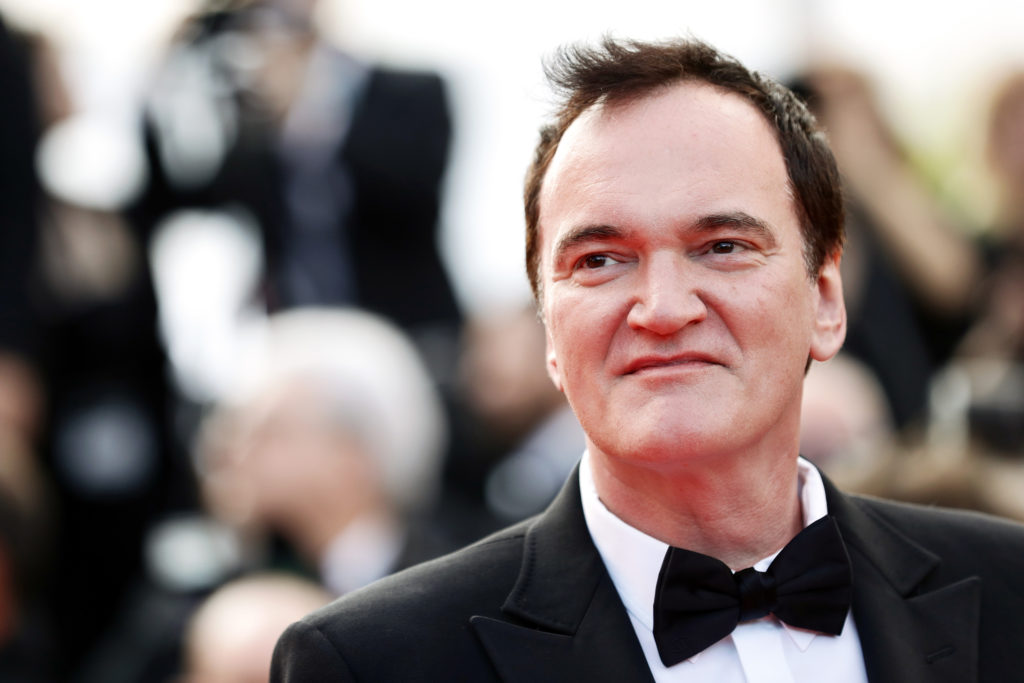 Right Now #1: Quentin Tarantino – There is nobody on this list who holds a candle to Tarantino’s dialogue. There is nobody on this list who holds a candle to Tarantino’s scene-writing. And when it comes to characters, well, most writers on this list haven’t created more memorable characters in their entire career than Tarantino has in a single one of his movies. He takes more chances than anyone else. He created his own genre. You never know where his stories are going. This guy doesn’t have any rivals. Two personal experiences stand out to me whenever I think of Tarantino’s greatness. Experience 1: I was sitting in Once Upon a Time in Hollywood, which is a movie about an actor whose career is on the downslide, and smack dab in the middle of the movie Tarantino switches over into another universe and gives us an amazing 20 minute short horror film! He just switched genres for 20 minutes!!! Then went right back to the story he was telling. Who else can pull that off besides Tarantino? Experience 2: I tried to watch The Hateful Eight once, got bored, and gave up on it, figuring it was a rare dud from the established writer-director. But I checked it out several months later and discovered I turned it off right before the major twist happened that turned it into one of the coolest and most fun movies of the year. It reminded me that you never count Tarantino out. He’s always got a plan, even when it appears he doesn’t. In my opinion, this guy is the best screenwriter in all of Hollywood and nobody else comes close.
Right Now #1: Quentin Tarantino – There is nobody on this list who holds a candle to Tarantino’s dialogue. There is nobody on this list who holds a candle to Tarantino’s scene-writing. And when it comes to characters, well, most writers on this list haven’t created more memorable characters in their entire career than Tarantino has in a single one of his movies. He takes more chances than anyone else. He created his own genre. You never know where his stories are going. This guy doesn’t have any rivals. Two personal experiences stand out to me whenever I think of Tarantino’s greatness. Experience 1: I was sitting in Once Upon a Time in Hollywood, which is a movie about an actor whose career is on the downslide, and smack dab in the middle of the movie Tarantino switches over into another universe and gives us an amazing 20 minute short horror film! He just switched genres for 20 minutes!!! Then went right back to the story he was telling. Who else can pull that off besides Tarantino? Experience 2: I tried to watch The Hateful Eight once, got bored, and gave up on it, figuring it was a rare dud from the established writer-director. But I checked it out several months later and discovered I turned it off right before the major twist happened that turned it into one of the coolest and most fun movies of the year. It reminded me that you never count Tarantino out. He’s always got a plan, even when it appears he doesn’t. In my opinion, this guy is the best screenwriter in all of Hollywood and nobody else comes close.
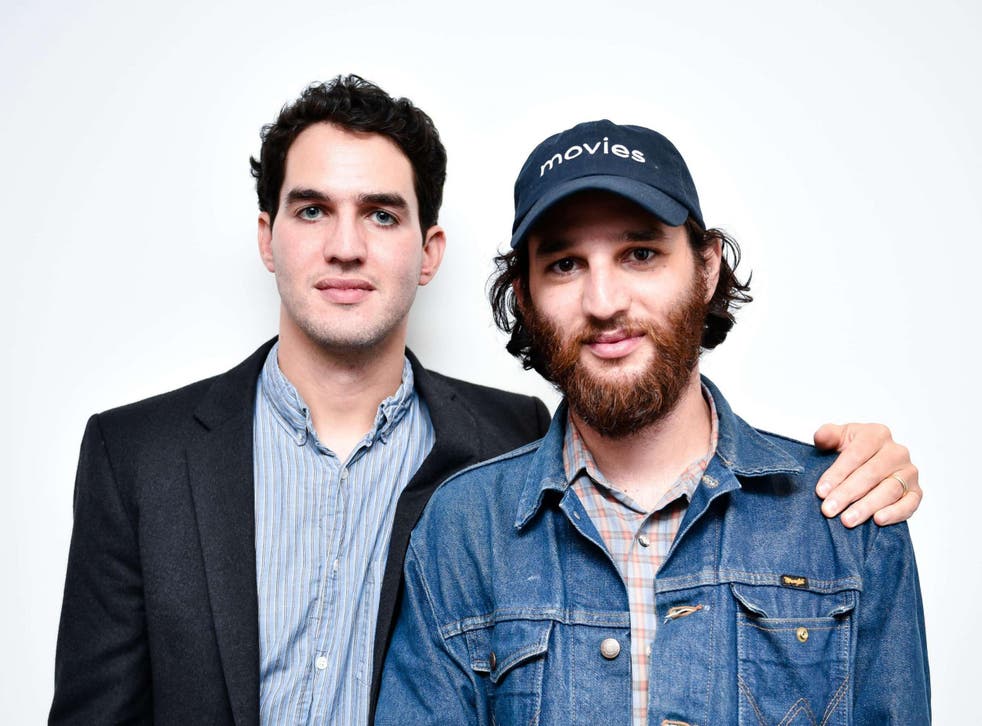 The Replacement: The Safdie Brothers – I remember when I first saw Good Time in an advance screening with no heads up on what I was getting into. I was blown away. I was even more blown away, two years later, by the directors’ writing habits, which included over 100 drafts of Uncut Gems. Their movies may seem improvised and unscripted, but that’s only because they do an ungodly amount of preparation, on both the writing and directing end, to make it seem that way. That’s when you know you’re a great screenwriter, when your dialogue is imperceptible from real life. These two bring an energy to the page that I don’t know if anyone in the next 20 years is going to be able to rival. Go check out Good Time. There’s a scene about 60 minutes in where this random drug dealer shows up and we go into this wild ten minute flashback of how this drug dealer ends up in our protagonists’ car. The randomness of that sequence combined with the fast-talking character combined with the non-linear flashback combined with the excessive focus on a character who, technically, had nothing to do with the movie, reminded me of early Tarantino. While I still don’t think anybody can hold a candle to Tarantino, I have a feeling these two can satisfy the same audience.
The Replacement: The Safdie Brothers – I remember when I first saw Good Time in an advance screening with no heads up on what I was getting into. I was blown away. I was even more blown away, two years later, by the directors’ writing habits, which included over 100 drafts of Uncut Gems. Their movies may seem improvised and unscripted, but that’s only because they do an ungodly amount of preparation, on both the writing and directing end, to make it seem that way. That’s when you know you’re a great screenwriter, when your dialogue is imperceptible from real life. These two bring an energy to the page that I don’t know if anyone in the next 20 years is going to be able to rival. Go check out Good Time. There’s a scene about 60 minutes in where this random drug dealer shows up and we go into this wild ten minute flashback of how this drug dealer ends up in our protagonists’ car. The randomness of that sequence combined with the fast-talking character combined with the non-linear flashback combined with the excessive focus on a character who, technically, had nothing to do with the movie, reminded me of early Tarantino. While I still don’t think anybody can hold a candle to Tarantino, I have a feeling these two can satisfy the same audience.
The ‘Almost Made It’ List: Donald Glover, James Cameron, Judd Apatow, Derek Kolstad, Chris Morgan, David O Russel, Martin McDonaugh, Tina Fey, Shonda Rhimes, Ryan Murphy, Steven Zallian, Woody Allen, Christopher Markus and Stephen McFeely, Christopher Miller and Phil Lord, Rhett Reese and Paul Wernick, Greg Daniels, Dan Harmon, Mike White, Isa Rae, John Logan, David Koepp, Charlie Kaufman, Brian Duffield, Adam McKay, Guillermo del Toro, Noah Baumbach, Noah Hawley, Charlie Brooker, and Alan Yang.
Genre: Comedy
Premise: Ten years after graduation, one of New York’s most eligible bachelors and his eccentric wanderlust wingman try to pull their recently divorced friend out of his rut by taking him back to Howard University’s legendary Homecoming for the best weekend of their lives.
About: Today’s script made the Black List last year, finishing in the 13th spot. It then went on to sell to Lionsgate early this year after being part of a small bidding war. What’s unique about the script is that it’s written by THREE SCREENWRITERS (who go by the name, “Murder Ink”).
Writers: Brandon Broussard & Hudson Obayuwana & Jana Savage (Murder Ink)
Details: 107 pages
 Michael B. Jordan for JB?
Michael B. Jordan for JB?
Three screenwriters?
Have you ever tried to keep track of changes on a script with just TWO screenwriters? It’s impossible! Good luck trying to find that scene that one of you deleted eight mini-drafts ago. “Hey Johnny, was that meet-cute scene in ‘draft 7.1b’ or ‘draft 3.6master (new inciting incident)’? I can’t find it!” The workflow of three screenwriters working on the same script must have digital crypto currency levels of sophistication.
That doesn’t even begin to get into the differences of opinion. It’s like having three people in a marriage! As if getting into a fight with your one wife isn’t frustrating enough. Just ask Will Smith.
Yesterday’s comedy was… very poor. Will today’s comedy make up for it?
Thad, 32, a successful Wall Street investor and eternal bachelor, heads back to Washington D.C., Howard University, for homecoming weekend. There, he meets up with his best friend from college, 32 year old JB, described as, “the guy that puts a napkin in his collar before eating fast food.” JB, who’s speaking on a panel at Howard, is fresh off his wife leaving him for a hotter younger stud.
No sooner does JB land than he’s driven to the Ethiopian Embassy and meets up with Sweet Milk, another 10 year graduate who can best be described as a mix between Kramer, Dwight, and DJ Jazzy Jeff. Sweet Milk will be appearing and disappearing throughout the story without rhyme or reason.
The bare bones story takes us through all the Homecoming checkpoints. The check-in, the dinner, the bars, the parties, the football game, the speaking panel. It’s sort of like The Hangover but without all the pomp and circumstance, to make a ‘graduation’ reference. Oh, and because Howard University is so famous, it has a bunch of celebrities there, like Kamala Harris, Danny Glover, and Ta-Nehisi Coates.
JB and Thad eventually run into Dana, their former classmate. Thad and Dana were that classic college duo who everybody thought would hook up but didn’t due to a continuous streak of bad timing. This may be their only chance to get together. JB, meanwhile, runs into his former professor he always had a crush on, Professor Winters, who is just as hot as she was a decade ago. But can JB forget about his ex-wife long enough to seal the deal?
Lots of stuff happens during the night. They get kicked out of every single bar in the city due to Thad hitting on a major club promoter’s wife. They get chased (in a lake!) by rival school’s mascot “Wally the Wolf” after they release him from his cage. And JB steals the spotlight away from fellow alum, Ta-Nehisi Coates, during their speaking panel, after he gets absolutely trashed and does a 20-minute on-the-fly dissertation about how to save black males in 2022.
That last scene was one of my favorites. Here’s the final part of it…
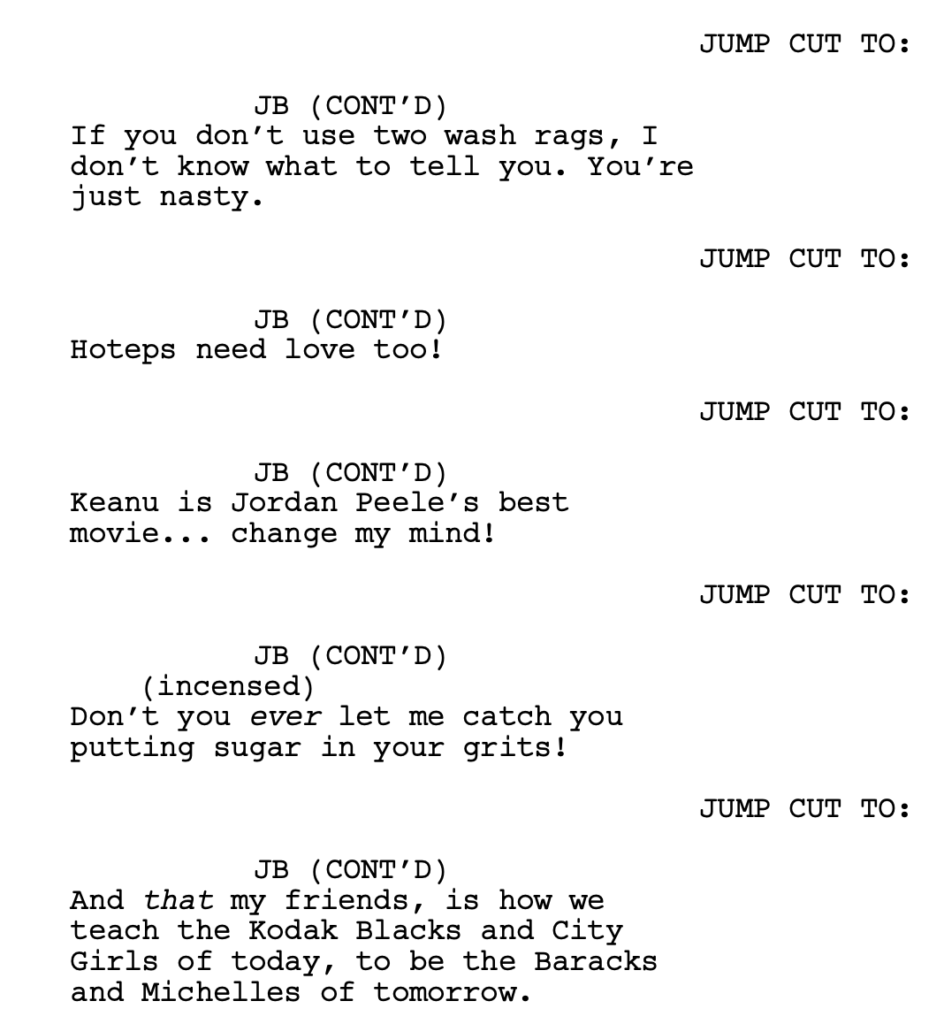
Finally, after the long weekend concludes, the guys must decide where they’re headed moving forward. Thad will need to figure out if he’s going to just make money and bang chicks the rest of his life (doesn’t sound so bad). JB must decide whether to stop deluding himself that his ex-wife is coming back (sounds worse). And Sweet Milk… well, let’s be real. Sweet Milk is never going to change. And everybody’s perfectly okay with that.
First thing’s first. This script is good. Waaaaay better than yesterday’s script. And this just shows you how faulty the Black List voting process is. The fact that this got 8 less votes than Killer Instinct is a joke, literally! The jokes were sharper here. The characters were better constructed. These writers have a much better command of the craft than yesterday’s writer. It’s night and day.
What’s interesting to note is that every script has its own unique challenge. Once you decide on the story you want to tell, you’re always posed with a major problem. How you solve that problem will determine whether the script works or doesn’t.
The problem with Homecoming is that there’s no plot. It’s just guys coming back for a weekend at college and having a good time. A “plotted” concept would be this exact same setup but… the three of them accidentally kill somebody during the night and have to cover it up.
The question then becomes, without a plot, how do you still make the story compelling? And a trick I always tell people is that if you’re going plotless, make the timeline as tight as possible. That way, your characters are always moving, there’s always stuff going on, and the reader doesn’t notice that there isn’t an actual plot to the story.
Dazed and Confused and Ferris Bueller’s Day Off are good examples of this. No plot to either of those stories. But we didn’t notice because they took place in a single day. I don’t think “Homecoming” works if these characters come home for an entire week. The lack of a story would’ve slowed the story to a crawl.
While I commend Homecoming for taking this approach, the issue does eventually catch up to the script. The story really only has one goal, which is JB speaking at the panel. Any time you’re telling the reader, “This is important and this is going to happen later,” the reader will look forward to that moment. Which is a tool you should take advantage of.
However, if you don’t have any “this is happening later” goals after that goal, you’re sort of leaving the reader out in the cold. Which is what happened here. After JB spoke at the panel, there was nothing left to really look forward to. Yes, I wanted to see if Thad and Dana got together. Yes I wanted to see if JB ditched his stupid ex-wife. But those are character things.
Look at The Hangover. We had the PLOT ELEMENT of needing to find Doug (the groom). So we always had that to drive us to the very end. It’s not that you need these things. There is no rulebook that says you do. But stories play better when there’s purpose behind the plot – when we’re moving towards a clear finish line. So if you don’t have that, you’re playing with fire.
With that said, the dialogue and jokes were really sharp in Homecoming and that says a lot about having three writers on a script. I made jokes at the start of this review about it being impossible to write with three people. But in comedy, it’s a huuuuuge advantage. It’s always better to have multiple people to bounce jokes off of because you know that if all three of you laugh, that joke is going in. Whereas, if you’re a lone comedy writer, it’s a complete guessing game. You may never actually know which jokes work and which don’t because nobody’s going through all your jokes to tell you.
I liked these writers and I liked their script. The reason it doesn’t rate above ‘worth the read’ is because after JB’s panel, it wasn’t totally clear what was left to say. It felt like we were walking towards the finish line instead of running. But, other than that, this was a fun ride. Definitely worth checking out.
[ ] What the hell did I just read?
[ ] wasn’t for me
[x] worth the read
[ ] impressive
[ ] genius
What I learned: If you write a comedy and you have some VERY GOOD FRIENDS, ask them to go through your script, and next to every single joke, write F for “Funny” or NF for “Not funny.” If you can get two people to do this, I guarantee your comedy will be a million times better because you’re going to find out which jokes suck and you can replace all of them with better ones.
